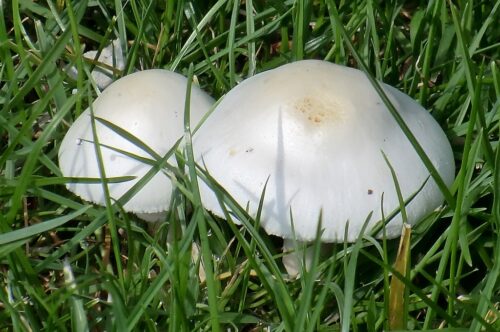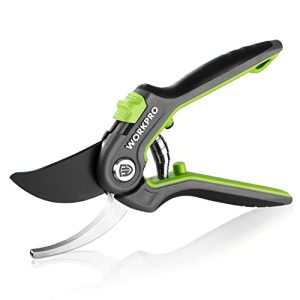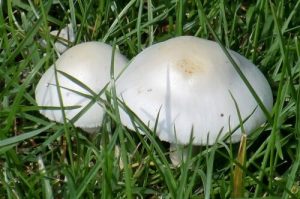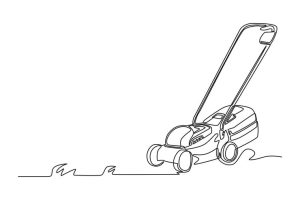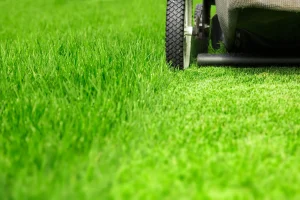Have you ever wandered out to your garden, only to find unwanted mushrooms sprouting up unexpectedly? These uninvited guests can quickly become a nuisance, overshadowing your beautiful plants and carefully tended lawn.
You might be tempted to reach for the weed killer, wondering if it could solve your mushroom problem. But before you do, it’s essential to understand how weed killers work and whether they can really eliminate these pesky fungi. We’ll dive into the world of mushrooms and weed killers, helping you discover the most effective way to tackle this common gardening challenge.
Stick around, and you’ll gain the insights you need to keep your garden looking its best.
Understanding Weed Killers
Weed killers, or herbicides, help control unwanted plants. They target weeds but may affect other plants. Using them requires understanding their types and how they work. This ensures safety and effectiveness in your garden.
Types Of Weed Killers
Weed killers come in different forms. Each serves a specific purpose:
- Selective Herbicides:Target specific plant types, leaving others unharmed.
- Non-Selective Herbicides:Kill all plants they contact, useful for clearing areas completely.
- Systemic Herbicides:Absorbed by plants, killing them from the inside out.
- Contact Herbicides:Destroy plant tissues on contact, effective for quick results.
How Weed Killers Work
Weed killers disrupt plant growth in various ways. They may block photosynthesis, hindering food production. Others interfere with protein synthesis, stopping cell growth. Some affect root systems, preventing nutrient uptake. Each type works uniquely, ensuring precise weed control.

Credit: www.reddit.com
Mushrooms In The Garden
Mushrooms in your garden can be a surprising sight, often popping up overnight and adding a touch of whimsy to your landscape. While many gardeners might be tempted to reach for weed killer at the first sign of these fungi, it’s worth pausing to consider their role and potential benefits. Before you make a decision, let’s explore what mushrooms really do in your garden.
Role Of Mushrooms In Ecosystem
Mushrooms are nature’s recyclers. They break down organic matter, returning nutrients to the soil and helping plants thrive. These fungi are essential in maintaining a healthy garden ecosystem. You might notice improved soil fertility and increased plant growth where mushrooms flourish. So, instead of viewing them as a nuisance, consider their contribution to your garden’s health.
Another intriguing fact is their symbiotic relationship with plants. Certain mushrooms form partnerships with plant roots, enhancing nutrient absorption. This can lead to stronger, more resilient plants. Imagine your garden benefiting from a natural boost, all thanks to these unexpected visitors.
Common Garden Mushrooms
Not all mushrooms in your garden are created equal. Some are quite common and harmless, while others can be dangerous if ingested. Recognizing them can help you decide whether they’re a friend or foe. One of the most common types you might find is the fairy ring mushroom, often seen forming circles in lawns. These are usually harmless, although they can sometimes affect grass growth.
Another frequent visitor is the ink cap mushroom, known for its delicate, fleeting nature. These mushrooms tend to appear after rain and often dissolve quickly, leaving little impact on your garden. However, it’s crucial to identify any mushrooms correctly, especially if you have pets or children who might be tempted to touch or eat them.
Have you ever wondered why mushrooms seem to appear out of nowhere? Their spores travel through the air, landing and germinating when conditions are right. This means they can pop up unexpectedly, turning your garden into a mini wonderland overnight.
By understanding the role and types of mushrooms in your garden, you can make informed decisions about their presence. Would you rather embrace their benefits or opt for removal? The choice is yours, but the journey into the world of garden mushrooms is always fascinating.
Impact Of Weed Killers On Mushrooms
Mushrooms often sprout alongside weeds in gardens and lawns. Many wonder if weed killers can eliminate them. While weed killers target unwanted plants, their impact on fungi like mushrooms varies.
Chemical Interaction With Fungi
Weed killers contain chemicals designed to disrupt plant growth. These chemicals may not specifically target fungi. Mushrooms are a type of fungus. Their biological makeup differs from plants. This difference means that weed killers might not affect them directly. Some chemicals could harm the mushrooms’ environment. This can indirectly influence their growth.
Effectiveness Against Mushrooms
Weed killers are not always effective against mushrooms. Mushrooms have a unique lifecycle. They often grow from underground mycelium. Weed killers may destroy visible mushrooms. Yet, the mycelium remains untouched. This can lead to more mushrooms appearing later. To manage mushrooms, consider alternative methods. Improving drainage or removing organic debris helps. These methods address the root cause of mushroom growth.

Credit: www.facebook.com
Alternative Methods To Control Mushrooms
Will Weed Killer Kill Mushrooms Using weed killer may not effectively target mushrooms in your yard. Mushrooms are fungi, not weeds. Exploring alternative methods, like improving drainage and reducing organic debris, can help manage their growth.
Controlling mushrooms in your garden without resorting to weed killer can be both environmentally friendly and effective. These fungi often appear in damp, shaded areas where they thrive on organic material. While mushrooms aren’t harmful to your plants, their sudden appearance can be an eyesore. Let’s explore some alternative methods that you can easily try at home to manage these unwelcome guests.Natural Remedies
Consider using natural solutions to keep mushrooms at bay. Sprinkle baking soda over the affected area. This common household ingredient can alter the pH level of the soil, making it less hospitable for mushrooms. Vinegar is another effective remedy. Mix one part vinegar with four parts water in a spray bottle and apply directly to the mushrooms. Be cautious, though, as vinegar can affect the surrounding plants.Preventive Measures
Prevention plays a crucial role in managing mushroom growth. Keep your garden clean by removing organic debris like leaves and grass clippings. Mushrooms feed on decaying matter, so reducing their food source can help limit their growth. Improve soil drainage by aerating the soil. Mushrooms thrive in damp conditions, so promoting better airflow and water drainage can be a game-changer. Consider trimming trees and bushes to allow more sunlight to reach your garden. Mushrooms prefer shady areas, so increasing sunlight can deter their growth. Have you ever tried any of these methods? What worked best for you? Share your experience and thoughts in the comments below!Safe Practices For Garden Maintenance
Will weed killer kill mushrooms? Most weed killers don’t target fungi. Mushrooms often return unless the environment changes. Safe garden practices can help manage them.
Garden maintenance involves much more than simply keeping your plants and flowers healthy. It’s about creating a safe, balanced environment where every element in your garden can thrive. This includes understanding the role of different organisms, such as mushrooms, and how they interact with other elements like weed killers. Maintaining this delicate balance requires safe and responsible practices. Let’s delve into how you can achieve this balance while ensuring the health of your garden.Using Chemicals Responsibly
Applying weed killers can be effective, but it’s crucial to use them responsibly. Always read the labels and understand the specific instructions for each product. This ensures you apply the right amount, reducing the risk of harming non-target organisms like mushrooms. Consider the timing of your application. Spraying during a windy day or before rain can lead to unintended spread. This not only wastes the product but also affects nearby plants and organisms.Balancing Ecosystem Health
Your garden is a mini-ecosystem with its checks and balances. Mushrooms, for instance, play a vital role in breaking down organic material. They help recycle nutrients back into the soil, promoting healthier plants. Ask yourself if removing mushrooms is necessary. They may not be the nuisance you think they are. Sometimes, accepting their presence can lead to a more vibrant garden. Think about alternative methods for maintaining your garden’s health. Introducing beneficial insects or using organic mulch can reduce the need for chemical interventions. These strategies not only protect mushrooms but also enhance the overall ecosystem. By focusing on these practices, you can maintain a garden that’s not just beautiful but also sustainable and thriving.
Credit: www.reddit.com
Frequently Asked Questions
What Weed Killer Kills Mushrooms?
Most weed killers don’t target mushrooms. Remove them manually or improve lawn drainage. Use a fungicide for severe cases. Always follow product instructions for safe use.
How Do I Permanently Get Rid Of Mushrooms?
Remove mushrooms by improving drainage and sunlight exposure. Regularly aerate the soil. Use fungicide for persistent issues. Ensure proper lawn care to prevent regrowth.
Does Vinegar Kill Mushrooms?
Yes, vinegar can kill mushrooms. Its acidic nature effectively damages the mushroom’s structure. Spray a vinegar solution directly on mushrooms. Repeat the process until they disappear. Be cautious, as vinegar can also harm surrounding plants. Use it sparingly in garden areas to maintain plant health.
Will Dawn Dish Soap Kill Mushrooms?
Dawn dish soap does not effectively kill mushrooms. It might help remove them temporarily but won’t eliminate their spores. Use a fungicide or consult a professional for long-term solutions to control mushroom growth in your lawn or garden. Regular maintenance and proper drainage prevent mushroom proliferation.
Conclusion
Weed killers might not always affect mushrooms. They target plants, not fungi. This means mushrooms can survive even after using weed killers. Check the product label for details. Some weed killers may impact certain types of fungi. Always use caution when applying chemicals in your garden.
Consider non-chemical methods to manage mushrooms. Mushrooms often indicate healthy soil. They can be harmless and even beneficial. Removing organic debris might reduce mushroom growth. Understanding your garden’s needs helps maintain balance. Choose methods that protect your plants and soil health.

